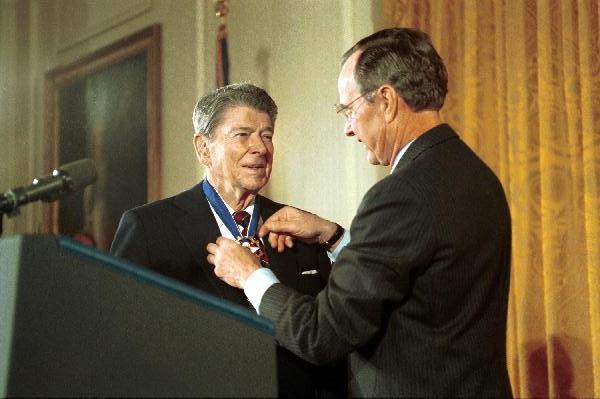During the second Republican primary debate of the 2016 election, the candidates and moderators said Ronald Reagan’s name 64 times. According to “The American Presidency Project,” a presidential data archive from the University of California at Santa Barbara, mentions of Reagan during the Republican primary debates have risen over the past five elections.
UCSB’s data also showed Democratic primary candidates hardly mention former liberal presidents during their debates. In the 29 Democratic primary debates since 1999, Franklin Roosevelt, John F. Kennedy and Bill Clinton were name-dropped a total of only 97 times. In the 48 Republican debates since that time, Reagan was mentioned more than five times as often.
Following the Iran-Contra Affair in 1986, nearly one in three Americans thought Reagan should consider resigning before his term ended. Despite his many failures as president, right-wingers often show an overzealous love for him and ignore his record, which deviates significantly from both modern conservative rhetoric and policy positions.
“Candidates will talk about the Reagan who cut government regulation, but not the one who increased the size of the federal government and the national debt,” said journalist Mark Fahey in an article for CNBC. “We hear about the Reagan who demanded that Mikhail Gorbachev ‘Tear down this wall’ and called Soviet Russia an ‘evil empire,’ but not the Reagan who later met diplomatically with Soviet leaders to form the foundation of nuclear disarmament.”
Because of his administration, the poor became poorer, the inner-city communities became exploited for profit and many other minorities suffered and even died because of governmental neglect.
Reagan tripled the Gross Federal Debt from $900 billion to $2.7 trillion and used “trickle-down economics” to expand economic inequality. According to the International Monetary Fund, when the top earners in society make more money, economic growth slows down. However, when poorer people earn more, society as a whole benefits.
The researchers’ calculations showed that the richest 20 percent of society increase their income by one percentage point, the annual rate of growth shrinks by nearly 0.1 percent within five years. “The benefits do not trickle down,” the researchers wrote in their report, which analyzed over 150 countries.
Part of the reason Reagan tripled the debt is he wanted to finally end the Cold War and roll back communism by “peace through strength.” Anti-communist resistance became a centerpiece of United States foreign policy, and the “Reagan Doctrine” allowed the U.S. to provide military and other support to anti-communist movements in Afghanistan, Angola, Nicaragua and elsewhere.
Many of Reagan’s foreign policy decisions hurt world relations in the long run, and arming and supporting the Mujahideen rebels in Afghanistan was perhaps his biggest mistake. Many members of the Mujahideen, including Osama bin Laden, used their experience in Afghanistan to help them form the terrorist organization al-Qaeda.
The administration’s judgement was clouded by the desperate desire to stop the flow of communism throughout the world. Consequences were destined to arise from arming rebel groups, and though the administration couldn’t have predicted al-Qaeda’s Sept. 11 terrorist attacks, they should have been more careful when arming non-American militant groups.
Reagan’s administration has more documented corruption than any other president in U.S. history. Over 138 of his administration’s officials, including several cabinet members, were investigated for, indicted for or convicted of crimes. Many of these crimes were in relation to the administration’s foreign policy, and though some of them were pardoned by George H.W. Bush, their wrongdoings should not be overlooked.
Reagan failed the country on many other issues, including the war on drugs and the AIDS crisis. His war on drugs helped exploit the poor and racial minorities for a profitable prison system, and the number of people behind bars for nonviolent drug law offenses increased from 50,000 in 1980 to over 400,000 by 1997.
While Reagan gave attention to “drug problem” in America, he ignored the thousands of mostly gay men who died from AIDS. By the time he finally publicly mentioned the term AIDS in 1985, more than 5,000 people had already been killed by the disease. His proposed federal budget for 1986 actually called for an 11 percent reduction in AIDS spending, and the administration did everything it could to neglect the crisis because of the demographic it affected.
Ronald Reagan was never a god, and he was nowhere near the president people make him out to be. He was a Trump-like candidate with better composure, and he used his fame as an actor to elevate himself to state and national politics. History may look back on him with a kind eye, but he was nothing more than a man lucky enough to be in the right place at the right time, running for office in a country desperate for a new wave of conservatism.
Lynne Bunch is an 18-year-old mass communication freshman from Terrytown, Louisiana.
Opinion: Ronald Reagan’s legacy overstated, spars with reality
By Lynne Bunch
March 14, 2017

Ronald Reagan ignored millions of Americans.




